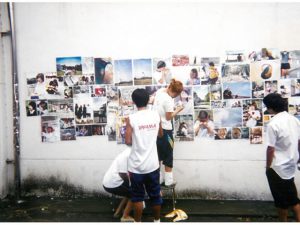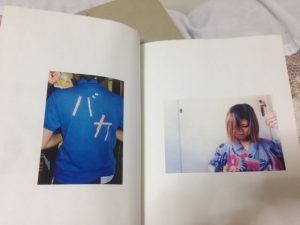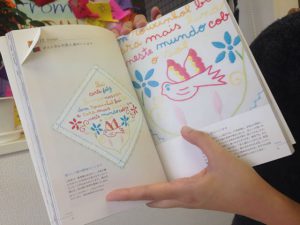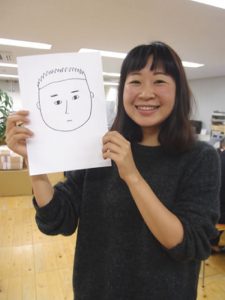[Original by Yuka WATANABE, 2015 Public Relations Intern (February 3, 2016); Translated by H. Sugishita/R. Florea]
[*She is now in charge of the Cambodia Project and stays at Siem Reap from December 2017.]
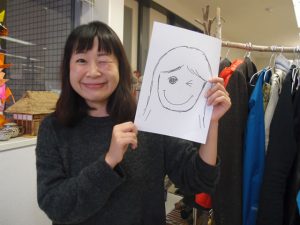
Ms. Omura with her picture drawn by the “artist” Onoyama. She mimicked the face, saying that the drawing does not look like her. But, after a closer look, she said, “Oh, it might resemble?” (laughing).
Hello, everyone. I’m a Public Relations intern, Watanabe. As the first interview in 2016, I interview Ms. Mariko Omura. She has been with JVC for two years and works in the Public Relations Division. I’m so excited for this interview!
I heard that you lived in Bangladesh and Singapore during your childhood.
Because of my father’s business, I had stayed in Bangladesh since 1985 (I was 2 years old at that time). After coming back to Japan once, I lived in Singapore for another 5 years. I only have a few memories about Bangladesh, but I heard more from my mother. She said that blackouts often happened and the sanitation wasn’t good. Many cockroaches would appear if she turned off the light in the kitchen. So she couldn’t turn off them except for blackouts. To get fresh meat and fish, she went to Bangkok twice a year, froze them, and used little by little. Although there was a lot of difficulty, she could do well thanks to the people around her. They were really kind people. The big and beautiful red sunset of Bangladesh was so impressive and could not be seen in Japan.
Your mother seems to be so powerful like you. Did you go to Singapore when you were an elementary school student?
My mother influenced me a lot. I learned from her that it is important to think first about the country where you are, not about Japan, and to enjoy its culture. I have a good memory of my time in Singapore. I had been there from the 2nd to the 6th grade of elementary school. I loved the country so much that I became sad when we had to go back to Japan. Various ethnic groups lived in Singapore. There was a mosque next to my elementary school, where many prayers came. A big festival of Hindu was held in the shopping street. The Chinese New Year was celebrated after Japanese New Year. All the cultures that I experienced were so exciting and fun.
Did those experiences affect your present life style?
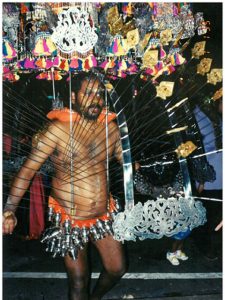
The Hindu festival called “Thaipusam”. She remembers the shock when she watched it close in her second grade year.
They are definitely the basis of my life style. I used school bus in Singapore. After school, many buses come to take children who live in various areas. Once when I was waiting for a bus, I found a huge monitor lizard waiting in a line with us. I laughed a lot! Another day, a giant python snake swallowed four ducks, which we raised at school. I couldn’t do anything but watching. I thought that “it is life” at that time, but now I understand that they were experiences that I couldn’t get in Japan. Also, it was a precious experience that I played with other children although we couldn’t communicate through languages. I don’t know if it’s because of this, but I often talk to foreigners in Japanese…
After that what kind of career did you have?
I live in Japan since junior high school. I always had a strong interest in foreign countries. When I thought about my future course, I decided to be a beautician because, if I get the techniques, I should be able to work only with my hands in any place of the world. I would also be able to enjoy life and culture of the country. After graduated high school, I entered a beauty school and practiced hard. When I finished the school, I got an award given to the students who achieved excellent results.
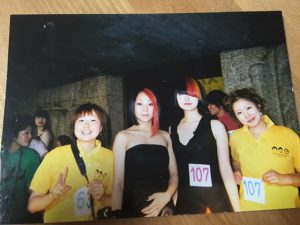
Ms. Omura (left) won the right to participate in the national competition of the hair cutting, techniques of blow-dry, and total beauty. She recruited her model (next to her) on a road.
After graduation, I worked at Omotesando. I spent exciting days, talking with people whom I might not meet in ordinary life. However, the work was in the center of fast-moving capitalism, and I frequently reconsidered the meaning of money. I had to deal with some other issues too, so I chose to quit the job. Although I loved the job of beautician, I thought to do farm stay in Australia at that time. I was really interested in a life without using money and foreign countries.
Nevertheless you worked at a company, didn’t you?
Yes, I wished to earn minimum amount of money before going abroad. I was also curious about ordinary jobs that are not technical. It was actually interesting, better than what I expected. I worked at the last company for 6 years. There was an attractive boss, and I felt that it was worth working with him for my future. I was transferred to Hokkaido once.
What did you do there?
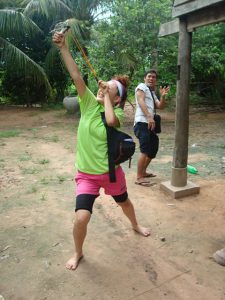
When I was a JVC intern, I visited the project area in Cambodia during summer vacation. I was fully absorbed in the slingshot to shoot coconuts, while people around me were frightened by my uncertain control…
I was a supervisor at the call center. When I supervised the biggest team, there were roughly 100 part-timers. I took charge of employment, too. I also did entire management, such as selecting people suited to the orders of clients, trainings of reception manners and business methods, checking products, and the control of budgets.
It was very interesting to work at the call center. There were various kinds of people in the part-timers: a member of a metal band, a chef collecting money to open a restaurant, a housewife, and so on. They had completely different ideas about job. It was fascinating to consider how to manage these differences. We worked so hard at the end of month, if we could not finish the work assigned to us! I came up with the ideas that everyone could enjoy gaining results. We chased targets every day. I couldn’t cry even in such a situation, as all the members were older than me and had wealthy experiences. Although there were many difficulties, I could learn the happiness to work as a team. Everyone helped me.
Why did you join JVC?
One night, when the matter in which I engaged had been solved, I contemplated what I would to do in the future. I wanted to do some work connected to the world, but I had been doing nothing. Every time I watched news on conflicts, the gap between my thought and my actions became bigger and bigger. I didn’t even do farm stay. I searched on the Internet with a keyword “international cooperation” for no reason. Then I found JVC offered internship. I thought this was what I wanted to do! The deadline was the next day, so I just pushed forward.
I was adopted as a public relations intern in 2013. Since I couldn’t quit the previous job right away, I did internship twice a week and the job three times a week. I appreciate my boss who allowed me to do this. While I was working as an intern, I noticed advantages and problems of NGO and finally wished to work there. When I was going to finish internship, JVC was recruiting a staff member. I applied for it and got the job. In the first year, I was in charge of selling calendars to earn profits, after that I moved to the Public Relations Department. This year is my second year as a staff member.
What were the problems you noticed?
I thought that dealing with international cooperation is a big challenge for ordinary people, since they should have special skills and knowledge. After involved in this work, however, I found that there were many interesting staff members. It is a pity that they close themselves in a small community. Therefore, I wanted to make opportunities for people to attend this community more casually, listening to the talk of staff members who have rich experiences. Of course we need special knowledge for some projects. But I believe that we have to provide a place where everyone can join us without hesitation, feel joy, and get satisfaction. I am conscious of it even now. Last year, we have collaborated with JAMMIN, a social wear brand, and WanderKitchen, a cafe & general goods store in Kamakura. It’s really nice to donate by buying cute stuff, eating delicious food, and enjoying life, isn’t it? I want to encourage these projects more. I also would like to launch a “Movie club” in which we watch movies related to our projects together.
(Learn more about our collaboration projects:
http://www.ngo-jvc.com/jp/tokyostaffdiary/2016/01/20160120-collaborate-jammin.html
http://www.ngo-jvc.com/jp/tokyostaffdiary/2016/01/20160120-wander-kitchen-project.html)
Thank you very much for interesting talks on your career and thoughts! I would like to ask you other questions. What kind of student were you?
I have already talked about my days of beauty school. When I was a high school student, I took pictures every day. I always carried a single-lens reflex camera with me. It was a camera of my father, which I got from him by saying that “I am only young once.” I wanted to record everything of my high school life. I have revived the photo club of my high school and served as the president.
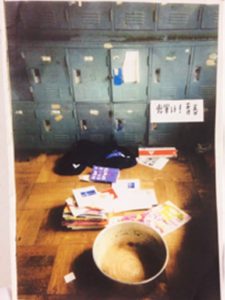
A photo album of her high school days entitled “Kagayake! Seisyun (Shine, my youth!)”. She is embarrassed by the title now.
You’ve been so powerful since high school days! Finally, could you tell me what you are passionate about now?
If it is OK other than job, then it’s “Pia-no-jaC”. I happened to go to a music festival, where the musicians on the stage totally captured me. It was a music band with only piano and cajon, a kind of percussion. They didn’t sing any song. I was so much attracted by their music. After getting home and checking them on the Internet, I also sympathized with their policy. They say in an interview that “Since we have no lyrics, we can go anywhere in the world with rhythm and melody. We connect the world by music across boarders.” I found this idea fantastic and came to love them more.
I also love embroidery. Until now, I have only enjoyed watching them, but I will complete my own work in 2016!
Thank you very much for today! As the last question, would you tell me your motto, if you have?
“A project which is not criticized by anybody is the project which doesn’t change anybody’s actions”. This is a motto that Mr. Hasegawa, a copywriter, said, when I worked together with him in an event CREATORS AMIGO. I won’t forget it.
-[My impression after the interview]
I often work with Ms. Omura as a public relations intern. Through this interview, I learned more about her ideas, personality, and reasons why she can always act powerfully. She goes forward in order to accomplish her aims. She sparkles and inspires me. Her sincere attitude on everything moves everyone’s mind.
-[Notice for the next interview!]
TThe next person to interview is “handsome in various ways” according to Ms. Omura. We are coming to the second half of our series Staff Interview 2015. Please look forward to reading the next!
Ms. Omura is now in charge of a project “TiQNoKo.”
http://www.ngo-jvc.com/campaign/lp/lesromanesques.html
* The order of uploading the English version of “Staff Interview” is random and hence different from the order of the original Japanese version. We are sorry, but the person coming next may be different from the “next person to be interviewed” mentioned in the text.
Share This:
